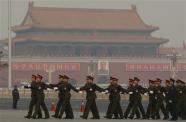|
|
本帖最后由 I'm_zhcn 于 2009-3-5 14:34 编辑
China advisory body defends Tibet crackdown
http://www.google.com/hostednews/ap/article/ALeqM5jGQDE0Z2LbFGRirzDQTs81WGjXlAD96MJLNG0
By ALEXA OLESEN – 1 day ago

Chinese soldiers march near the Tiananmen Square before the opening session of the Chinese People's Political Consultative Conference in Beijing's Great Hall of the People, China, Tuesday, March 3, 2009. The advisory body to China's legislature opened its annual session Tuesday, with the legislature, the National People's Congress, due to open on Thursday. (AP Photo/Ng Han Guan)

Chinese military band members rehearse before the opening ceremony for the Chinese People's Political Consultative Conference held at the Great Hall of the People in Beijing, China, Tuesday, Mar 3 , 2009. (AP Photo/Ng Han Guan)
BEIJING (AP) — China was right to crack down hard on rioters in Tibet last year, but needs to better explain its policies to the rest of the world, the country's main government advisory body said Tuesday.
Also Tuesday, a group of 20 activists who took part in the 1989 pro-democracy protests around Tiananmen Square sent an open letter to legislators gathering in the capital this week, calling on them to reinvestigate the military crackdown that quashed the student-led movement.
In opening the advisory body's annual session, Jia Qinglin reinforced the government's hard-line approach to dissent among Tibetans, just days ahead of the anniversary of a deadly March 14 riot in Tibet's capital, Lhasa, that sparked the biggest anti-government protests in decades.
"We unequivocally supported the party and government in dealing with the destructive and disruptive, violent and illegal incidents in Lhasa, Tibet and other areas in accordance with the law," Jia, the body's chairman, said in a nationally televised speech from the Great Hall of the People in central Beijing.
The riots in Lhasa left at least 22 dead and resulted in the government clamping down on ethnic Tibetan areas throughout the country. Tibetan activists say Chinese security forces have killed dozens in their crackdown.
China claims that Tibet has always been part of its territory, but many Tibetans say the Himalayan region was virtually independent for centuries. Tibet's exiled spiritual leader, the Dalai Lama, heads a self-proclaimed government-in-exile in northern India but says he is only seeking autonomy, not independence, for the region.
Jia said in 2009, China would have more exchanges with world religious and peace organizations.
"We will improve our external publicity work to help the international community acquire a better understanding of our country's political system and system of political parties," he said.
However, Tibet advocates say the inherent problem lies not in China's presentation of its message, but with its failed policies in the Himalayan region.
"The crisis in Tibet has been ongoing for a year ... and it has only deepened. This is not a matter of presentation. There needs to be a complete overhaul of the failed policies by the Chinese Communist Party," said Matt Whitticase with the London-based Free Tibet group.
The open letter from the Tiananmen activists called on officials to launch a new investigation into the role of then-supreme leader Deng Xiaoping and former Premier Li Peng in ordering a military crackdown that used "the weapons of war to massacre peaceful citizens."
China has never offered a full accounting of the crackdown, which government leaders refer to as a "political disturbance." An official silence has been maintained around the incident, with nothing written in school textbooks and public discussion virtually taboo.
Jia's body, the Chinese People's Political Consultative Conference, is tasked with submitting nonbinding suggestions to the legislature, the National People's Congress, which begins its annual session on Thursday.
The annual meeting of the conference, which runs until March 12, and the NPC's nine-day session, are the first for China since the worldwide financial meltdown started last year.
Both are widely expected to yield further measures to stimulate the economy. Jia said the meeting would focus "on hot and thorny issues," such as employment, the social safety net, education and environmental protection.
Although China is one of the few major economies still growing, growth fell to a seven-year low of 6.8 percent in the final quarter of 2008 compared with the same period a year earlier. The slip has hit export industries hard, causing more than 20 million migrant workers to lose their jobs in recent months.
China announced a 4 trillion yuan ($586 billion) stimulus plan in November aimed at boosting domestic consumption to help cushion the impact of the global slowdown, though the effects of massive spending will take time to show.
The plan calls for pumping money into the economy through spending on public works. Such construction projects have been magnets for corruption in the past.
Copyright © 2009 The Associated Press. All rights reserved. |
advisory, body, crackdown, defends, Tibet, advisory, body, crackdown, defends, Tibet, advisory, body, crackdown, defends, Tibet
|